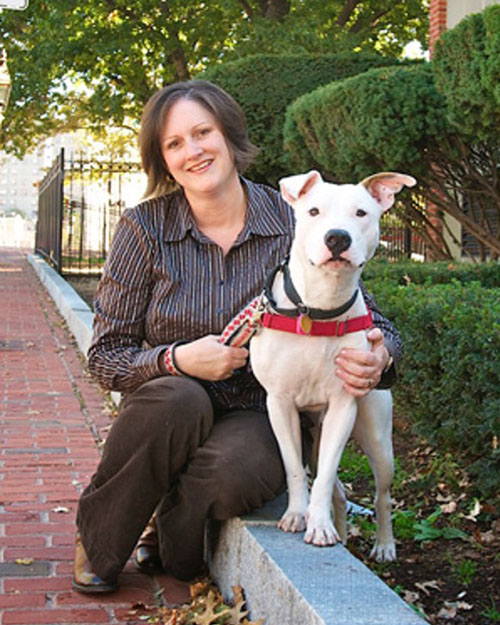-
About
- Leadership & Faculty
- News & Events
-
Admissions
-
Academics
- Graduate
- Advanced Clinical Training
- Continuing Education
- Academic Departments
- Academic Offices
- Simulation Experiences
-
Student Life
- Offices
-
Research
-
- Transformative Research
- Centers & Shared Resources
-
-
Hospitals & Clinics
- Emergency Care
- Hospital Services
-
Community Outreach
- Volunteer
Animal Welfare, Ethics and Policy
The Animal Welfare, Ethics, and Policy Signature Opportunity at Cummings School of Veterinary Medicine at Tufts University builds on the Center for Animals and Public Policy's (CAPP) 30-year tradition of teaching ethics and values.
Linking Human-Animal Relationships and Well-Being
At the heart of this program is CAPP’s mission: the idea that understanding human-animal relationships helps improve the well-being of both humans and animals. Educating veterinary students about this connection and the underlying concept of “One Health” creates opportunities for graduates to make a difference for animals and society in any career path, from private practice to public service.
Program Goals
The Animal Welfare, Ethics, and Policy Signature Opportunity:
• Educates future veterinarians to better serve clients, patients, and society through an understanding of the vital role animals play in families and communities.
• Empowers students to lead efforts that enhance animal and human health in underserved communities.
• Prepares graduates to influence policy, helping to shape government, community, and institutional practices that promote animal health and welfare.
• Increases student awareness of societal trends that affect the veterinary profession.
Curriculum
Core Courses
-
Founded in the 1980's by Dr. Elizabeth Atwood Lawrence, a distinguished veterinarian and anthropologist, this course introduces first-year D.V.M. students to the many social and cultural contexts in which people and animals interact and how diverse value systems influence our ideas of animal welfare. This class establishes the broad context of veterinary education at the Cummings School and prepares students to think about how social trends will influence their careers in veterinary medicine.
-
This course introduces second-year D.V.M. students to the basics of the legal system. It explores topics of particular relevance to veterinarians and veterinary practice, including malpractice, animal cruelty and professional responsibility.
-
In this course, second-year D.V.M. students learn to apply principles of ethical reasoning to decision-making in veterinary practice in the clinic, animal shelter, laboratory, farm, and other settings. Throughout this course, students are encouraged to search out their own ethical values, consider multiple sides of an issue, and respectfully hear the opinions of colleagues.
-
Third-year D.V.M. students take an intensive lecture-discussion workshop that addresses appropriate methods of euthanasia, situations in which euthanasia is utilized, ethical implications of euthanasia, and the emotional aspects of euthanasia as they relate to client, staff and veterinarian grief.
-
In this small-group seminar, convened during fourth-year clinical rotations, all D.V.M. students are asked to present to classmates and a faculty facilitator the ethical dimension of a case that they have either handled or observed themselves. The course helps students recognize that the broad issues of professional and social ethics are closely intertwined with daily practice.
Selectives and Electives
First- and second-year Doctor of Veterinary Medicine (D.V.M.) students can choose from a variety of elective courses that encourage deeper exploration of animal-related issues encountered in veterinary practice and within their communities.
Many electives are offered jointly with the Master of Science in Animals and Public Policy (MAPP) and Master of Science in Conservation Medicine (MCM) programs, enriching classroom discussions with diverse perspectives from across disciplines.
Electives are available during the D.V.M. Preclinical Elective Week and throughout the clinical year curriculum.
Offerings vary each year and semester, but examples of selectives include:
-
Under the law, animals are considered property, but the courts are increasingly recognizing that animals possess unique interests. This elective delves into the statutes and landmark court decisions that impact the health, well-being, and legal status of animals. It also explores how changes in the law may affect the veterinary profession.
-
Students visit several dairy farms that are clients of the Tufts Veterinary Field Service. During these tours, they gain exposure to aspects of dairy production and different farming methods. The class centers around examining and comparing specific animal husbandry styles and their impact on farm animal welfare. Students discuss these issues from a practical on-farm perspective.
-
This elective examines the various reasons behind the captivity of wildlife, including in zoos and aquariums, as pets, for entertainment, trade, education, research, and rehabilitation. Guided by faculty and wildlife professionals, students conduct in-depth discussions of the ethical, historical, animal welfare, and One Health implications of these practices.
-
Explore the foundations of animal welfare—what it means, why it matters, and how it’s measured. This elective provides an overview of the history, legislation, and policies that shape animal welfare in the U.S. and around the world. Students will learn key methods for evaluating welfare, from assessing stress and physical health to understanding mental states and quality of life. Hands-on training includes practical welfare assessments in farm and other real-world settings.
-
This elective explores the behavior of common companion animals across family, community, and shelter environments. Students learn to interpret animal body language, recognize typical and problem behaviors, and examine how human perceptions shape our understanding of animal behavior. Through interactive discussions, the course highlights how these perceptions influence our relationships with companion animals.
-
This elective covers the science of the health effects of living with pets, terminology and legal access for service animals and emotional support animals, animal-assisted interventions, primary and preventative care in working dogs, and a demonstration of police working dogs.
In addition, practicum selectives are offered through the Center for Animals and Public Policy, including:
Faculty
Contact
Center for Animals and Public Policy
Cummings School of Veterinary Medicine at Tufts University
200 Westboro Road
Jean Mayer Administration Building
North Grafton, MA 01536
508-839-7991
capp@tufts.edu





